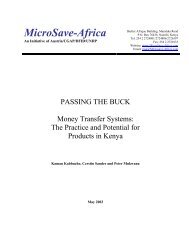Create successful ePaper yourself
Turn your PDF publications into a flip-book with our unique Google optimized e-Paper software.
The Khan Bank<br />
One <strong>of</strong> the highest-pr<strong>of</strong>ile achievements <strong>of</strong> <strong>DAI</strong>’s banking<br />
sector work took place in Mongolia. In 1991, after the<br />
Democratic Revolution set socialist Mongolia on the road<br />
to reform, the government turned a former state monopoly<br />
institution into the Agricultural Bank <strong>of</strong> Mongolia. The experiment<br />
failed fast, losing millions in just a few <strong>years</strong> and<br />
leading the World Bank to call the institution “irreparably<br />
damaged.” In 1999, with some <strong>40</strong>,000 depositors depending<br />
on the bank, <strong>DAI</strong> agreed to help, bringing in a team headed<br />
up by Peter Morrow, the former CEO <strong>of</strong> the Bank <strong>of</strong> Phoenix.<br />
The problem at the bank was a familiar one in transitioning<br />
countries—business was done on a personal level, and the<br />
bank customarily made corrupt “loans” that the well-connected<br />
recipients never expected to pay <strong>of</strong>f. <strong>DAI</strong>’s management<br />
introduced badly needed financial discipline, halted<br />
the privileged “loans,” and soon had the bank’s default rate<br />
below 1 percent. New depositors flocked to the renamed<br />
“Khan Bank,” which had 500,000 customers by late 2003.<br />
It was purchased by a Japanese firm the same year. “The<br />
American management team has done a brilliant job,” said<br />
the new president. Putting his money where his mouth was,<br />
he retained <strong>DAI</strong>’s management.<br />
52<br />
Transforming the Organization<br />
Even as fresh faces were helping to move <strong>DAI</strong> along new<br />
market paths in the 1990s, Mickelwait continued his longstanding<br />
practice <strong>of</strong> sending up “solar flares” to press the<br />
case for faster, more aggressive growth. “He always liked<br />
to shake things up and turn things upside down from conventional<br />
ways <strong>of</strong> thinking and doing things,” Jim Packard<br />
Winkler recalled. The first shake-up came after the aborted<br />
ICF merger in 1991: that fall, management directives pushed<br />
authority and responsibility farther down into the company’s<br />
ranks and gave line managers much more autonomy. A<br />
year later, Mickelwait reported to the Board <strong>of</strong> Directors that<br />
“decentralization had inspired an entrepreneurial spirit” that<br />
explained <strong>DAI</strong>’s success in entering the Central and Eastern<br />
Europe market. He had solid evidence to support this claim.<br />
But there were trouble signs. For one thing, USAID was in<br />
a weakened condition and had begun to lose many <strong>of</strong> its<br />
senior technical personnel to retirement, without funds to hire<br />
replacements. Its operating expense budget was aggressively<br />
questioned and cut in successive congressional appropriations<br />
cycles. Under the “Bush 41” and Clinton administrations,<br />
Congress created and implemented separate funding<br />
accounts for Central Europe and the former Soviet Union, in<br />
each case giving the State Department control over how the<br />
money would be programmed and spent. The implication was<br />
that in these key transition economies, USAID was perhaps<br />
no longer the premier development agency, and this damaged<br />
internal morale. In the field and in Washington, <strong>DAI</strong> staff<br />
learned to roll with the punches, empathizing with their clients<br />
and demonstrating that the firm was a reliable partner to the<br />
agency in its difficult times.<br />
The start <strong>of</strong> the Clinton administration in 1993 brought different<br />
priorities, some expectations <strong>of</strong> increased attention



